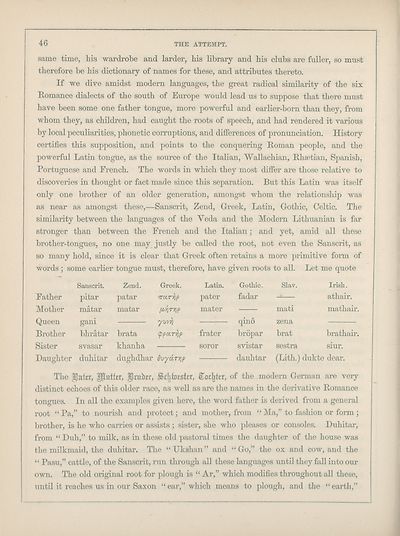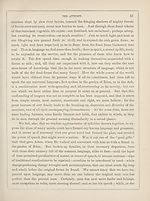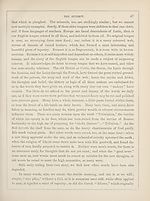Download files
Complete book:
Individual page:
Thumbnail gallery: Grid view | List view

46
THE ATTEMPT.
same time, his wardrobe and larder, his library and his clubs are fuller, so must
therefore be his dictionary of names for these, and attributes thereto.
If we dive amidst modern languages, the great radical similarity of the six
Romance dialects of the south of Europe would lead us to suppose that there must
have been some one father tongue, more powerful and earlier-born than they, from
whom they, as children, had caught the roots of speech, and had rendered it various
by local peculiarities, phonetic coiTuptions, and differences of pronunciation. History
certifies this supposition, and points to the conquering Roman people, and the
powerful Latin tongue, as the source of the Italian, Wallachian, Rhsetian, Spanish,
Portuguese and French. The words in which they most differ are those relative to
discoveries in thought or fact made since this separation. But this Latin was itself
only one brother of an older generation, amongst whom the relationship was
as near as amongst these,—Sanscrit, Zend, Greek, Latin, Gothic, Celtic. The
similarity between the languages of the Veda and the Modern Lithuanian is far
stronger than between the French and the Italian; and yet, amid all these
brother-tongues, no one may justly be called the I'oot, not even the Sanscrit, as
so many hold, since it is clear that Greek often retains a more primitive form of
words; some earlier tongue must, therefore, have given roots to all. Let me quote
Father
Mother
Queen
Brother
Sister
Daughter
Sanscrit.
pitar
matar
gani
bhratar
svasar
duhitar
Zend.
patar
matar
brata
khanha
dughdhar hydrr/P
Greek.
Tar rip
MfnP
yvvri
(pparrjp
Latin,
pater
mater
frater
soror
Gothic,
fadar
qino
bropar
svistar
Slav.
mati
zena
brat
sestra
Irish.
athair.
mathair.
brathair.
siur.
dauhtar (Lith.) dukte dear.
The l^attr, pwtkr, ^rubfr, Bchktstn, Cotljter, of the modern German are very
distinct echoes of this older race, as well as are the names in the derivative Romance
tongues. In all the examples given here, the word father is derived from a general
root " Pa," to nourish and protect; and mother, from " Ma," to fashion or form ;
brother, is he who carries or assists; sister, she who pleases or consoles. Duhitar,
from " Dull," to milk, as in these old pastoral times the daughter of the house was
the milkmaid, the duhitar. The "Ukshan" and "Go," the ox and cow, and the
" Pasu," cattle, of the Sanscrit, run through all these languages until they fall into our
own. The old original root for plough is " Ar," which modifies throughout all these,
until it reaches us in our Saxon "ear," which means to plough, and the "earth,"
THE ATTEMPT.
same time, his wardrobe and larder, his library and his clubs are fuller, so must
therefore be his dictionary of names for these, and attributes thereto.
If we dive amidst modern languages, the great radical similarity of the six
Romance dialects of the south of Europe would lead us to suppose that there must
have been some one father tongue, more powerful and earlier-born than they, from
whom they, as children, had caught the roots of speech, and had rendered it various
by local peculiarities, phonetic coiTuptions, and differences of pronunciation. History
certifies this supposition, and points to the conquering Roman people, and the
powerful Latin tongue, as the source of the Italian, Wallachian, Rhsetian, Spanish,
Portuguese and French. The words in which they most differ are those relative to
discoveries in thought or fact made since this separation. But this Latin was itself
only one brother of an older generation, amongst whom the relationship was
as near as amongst these,—Sanscrit, Zend, Greek, Latin, Gothic, Celtic. The
similarity between the languages of the Veda and the Modern Lithuanian is far
stronger than between the French and the Italian; and yet, amid all these
brother-tongues, no one may justly be called the I'oot, not even the Sanscrit, as
so many hold, since it is clear that Greek often retains a more primitive form of
words; some earlier tongue must, therefore, have given roots to all. Let me quote
Father
Mother
Queen
Brother
Sister
Daughter
Sanscrit.
pitar
matar
gani
bhratar
svasar
duhitar
Zend.
patar
matar
brata
khanha
dughdhar hydrr/P
Greek.
Tar rip
MfnP
yvvri
(pparrjp
Latin,
pater
mater
frater
soror
Gothic,
fadar
qino
bropar
svistar
Slav.
mati
zena
brat
sestra
Irish.
athair.
mathair.
brathair.
siur.
dauhtar (Lith.) dukte dear.
The l^attr, pwtkr, ^rubfr, Bchktstn, Cotljter, of the modern German are very
distinct echoes of this older race, as well as are the names in the derivative Romance
tongues. In all the examples given here, the word father is derived from a general
root " Pa," to nourish and protect; and mother, from " Ma," to fashion or form ;
brother, is he who carries or assists; sister, she who pleases or consoles. Duhitar,
from " Dull," to milk, as in these old pastoral times the daughter of the house was
the milkmaid, the duhitar. The "Ukshan" and "Go," the ox and cow, and the
" Pasu," cattle, of the Sanscrit, run through all these languages until they fall into our
own. The old original root for plough is " Ar," which modifies throughout all these,
until it reaches us in our Saxon "ear," which means to plough, and the "earth,"
Set display mode to: Large image | Transcription
Images and transcriptions on this page, including medium image downloads, may be used under the Creative Commons Attribution 4.0 International Licence unless otherwise stated. ![]()
| Ladies' Edinburgh Debating Society publications > Attempt > Volume 3 > (60) Page 46 |
|---|
| Permanent URL | https://digital.nls.uk/104343952 |
|---|
| Attribution and copyright: |
|
|---|

